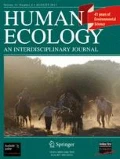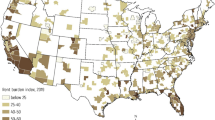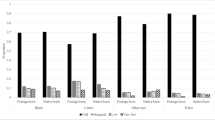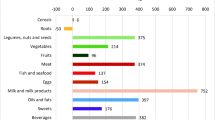Abstract
Although food sharing has been observed in many traditional societies, we still do not have a deep understanding of how various ecological conditions produce variation in who gives and who receives specific resources. To understand better the behavioral ecology of food sharing, we present data collected with the Hiwi of Venezuela and focus on two questions: (a) How do characteristics of food resources and acquirers determine how much is transfered to others? (b) How do characteristics of nuclear families A and B influence how much is transferred between A and B? We use path modeling in an attempt to tease apart the relative contribution of biological kinship, geographical proximity between households, family size, and quantities family B gave to family A on the expected quantities that family A gives to family B. Reciprocal altruism is shown to be an important link in the chain of factors, but not in the tit-for-tat form common in theoretical treatments of reciprocity.
Similar content being viewed by others
REFERENCES
Arcand, B. (1976). Cuiva food production. Canadian Review of Sociology and Anthropology 13: 387–396.
Axelrod, R. (1984). The Evolution of Cooperation, Basic Books, New York.
Axelrod, R., and Dion, D. (1988). The further evolution of cooperation. Science 242: 1385–1389.
Axelrod, R., and Hamilton, W. D. (1981). The evolution of cooperation. Science 211: 1390–1396.
Bentler, P. M. (1989). EQS Structural Equations Program Manual, BMDP Statistical Software, Los Angeles.
Bentler, P. M., and Bonett, D. G. (1980). Significance tests and goodness-of-fit in the analysis of covariance structures. Psychological Bulletin 88: 588–606.
Binmore, K. (1994). Game Theory and the Social Contract, Vol 1. Playing Fair, MIT Press, Cambridge, MA.
Bleige-Bird, R. L., and Bird, D. W. (1997). Delayed reciprocity and tolerated theft: The behavioral ecology of food-sharing strategies. Current Anthropology 38: 49–78.
Blurton Jones, N. (1987). Tolerated theft, suggestions about the ecology and evolution of sharing, hoarding, and scrounging. Social Science Information 26: 31–54.
Boyd, R. (1992). The evolution of reciprocity when conditions vary. In Harcourt, A. H., and de Waal, F. B. M. (eds.), Coalitions and Alliances in Humans and Other Animals, Oxford University Press, New York, pp. 473–489.
Coppens, W. (1975). Los Cuiva de San Esteban de Capanaparo: Ensavo de antropologia aplicada, Monograph 19, Fundació n La Salle de Ciencias Naturales, Instituto Caribe de Antropologia y Sociologia, Editorial Sucre, Caracas.
Cosmides, L. (1989). The logic of social exchange: Has natural selection shaped how humans reason? Studies with the Wason selection task. Cognition 31: 187–226.
de Waal, F. B. M. (1997a). Food transfers through mesh in brown capuchins. Journal of Comparative Psychology 111: 370–378.
de Waal, F. B. M. (1997b). The chimpanzee's service economy: food for grooming. Evolution and Human Behavior 18: 375–386.
Dugatkin, L. A., and Mesterton-Gibbons, M. (1995). Cooperation among unrelated individuals: Reciprocal altruism, byproduct mutualism, and group selection in fishes. Biosystems 37: 19–30.
Fonval, F. (1976). Les Cuiva du Venezuela, Ph.D. dissertation, École des Hautes Études en Sciences Sociales, Paris.
Frean, M. (1996). The evolution of degrees of cooperation. Journal of Theoretical Biology182: 549–559.
Gurven, M. (2000). Reciprocal altruism and food sharing decisions among hunter-gatherers (in preparation).
Hames, R. (1987). Garden labor exchange among the Ye'kwana. Ethology and Sociobiology 8: 354–392.
Hames, R. (1998). Reciprocal altruism in Yanomamo food exchange. In Chagnon, N., Cronk, L., and Irons, W. (eds.), HumanBehavior and Adaptation: An Anthropological Perspective, Aldine de Gruyter, New York.
Hatcher, L. (1994). A Step-by-Step Approach to Using the SAS System for Factor Analysis and Structural Equation Modeling, SAS Institute Inc., Cary, NC.
Hawkes, K. (1991). Showing off: Tests of an hypothesis about men's foraging goals. Ethology and Sociobiology 12: 29–54.
Hawkes, K. (1992). Sharing and collective action. In Smith, E. A., and Winter halder, B. (eds.), Evolutionary Ecology and Human Behavior, Aldine de Gruyter, New York, pp. 269–300.
Hawkes, K. (1993). Why hunter-gatherers work: An ancient version of the problem of public goods. Current Anthropology 34: 341–361.
Hawkes, K., O'Connell, J., and Blurton Jones, N. (1989). Hardworking Hadza grandmothers. In Foley, B. and Standen, V. (eds.), Comparative Socioecology of Mammals and Man, Basil Blackwell, London, pp. 341–366.
Hill, K., and Kaplan, H. (1989). Population description and dry season subsistence patterns among the newly contacted Yora (Yaminahua) of Manu National Park, Peru. National Geographic Research 3: 317–324.
Hill, K., and Kaplan, H. (1993). On whymale foragers hunt and share food. Current Anthropology 34: 701–710.
Hurtado, A. M., and Hill, K. (1986). The Cuiva: Hunter-gatherers of western Venezuela. Anthroquest: News of Human Origins, Behavior, and Survival 36: 14–22.
Hurtado, A. M., and Hill, K. (1987). Early dry season subsistence ecology of Cuiva (Hiwi) foragers of Venezuela. Human Ecology 15: 163–187.
Hurtado, A. M., and Hill, K. (1990). Seasonality in a foraging society: variation in diet, work effort, fertility, and sexual division of labor among the Hiwi of Venezuela. Journal of Anthropological Research 46: 293–345.
Hurtado, A. M., and Hill, K. (1991). Paternal effect on offspring survivorship among Ache and Hiwi hunter-gatherers: Implications for modeling pair-bond stability. In Hewlett, B. (ed). Father-Child Relations: Cultural and Biosocial Contexts, Aldine de Gruyter, New York, pp. 31–55.
Hurtado, A. M., Hill, K., Kaplan, H., and Hurtado, I. (1992). Trade-offs between female food acquisition and child care among Hiwi and Ache foragers. Human Nature 3: 185–216.
Isaac, G. (1978). The food-sharing behavior of protohuman hominids. Scientific American 238: 90–108.
Kacelnik, A. (1997). Normative and descriptive models of decision making: time discounting and risk sensitivity. In Bock, G., and Cardew, G. (eds.), Characterizing Human Psychological Adaptations, Ciba Foundation Symposium 208, Wiley, Chichester, UK.
Kaplan, H. (1983). The Evolution of Food Sharing Among Adult Conspecifics: Research with Ache Hunter-Gatherers of Eastern Paraguay, Ph.D. thesis, University of Utah, Salt Lake City.
Kaplan, H., and Hill, K. (1985). Food sharing among Ache foragers: tests of explanatory hypotheses. Current Anthropology 26: 223–245.
Kaplan, H., Hill, K., Hawkes, K., and Hurtado, A. (1984). Food sharing among the Ache hunter-gatherers of eastern Paraguay. Current Anthropology 25: 113–115.
Kirby, K. N., and Herrnstein, R. J. (1995). Preference reversals due to myopic discounting of delayed reward. Psychological Science 6: 83–89.
Kurland, J. A. (1991). The good, the bad, and the ugly: Moral lessons from social anthropology and evolutionary biology. Reviews in Anthropology 20: 125–137.
Kurland, J. A., and Beckerman, S. (1985). Optimal foraging and hominid evolution: Labor and reciprocity. American Anthropologist 87: 73–93.
Lévi-Strauss, C. (1969). The Elementary Structures of Kinship, Beacon Press, Boston.
Loehlin, J. C. (1987). Latent Variable Models: An Introduction to Factor, Path, and Structural Analysis, L. Erlbaum Associates, Hillsdale, NJ.
Mauss, M. (1967). The Gift, Norton, New York.
Mesterton-Gibbons, M., and Dugatkin, L. A. (1992). Cooperation among unrelated individuals: Evolutionary factors. Quarterly Review of Biology 67: 267–281.
Milinski, M. (1987). Tit-for-tat in sticklebacks and the evolution of cooperation. Nature 325: 434–435.
Nöe, R. (1990). A veto game played by baboons: a challenge to the use of the prisoner's dilemma as paradigm for reciprocity and cooperation. Animal Behavior 39: 78–90.
Nöe, R., van Schaik, C., and van Hooff, J. (1991). The market effect: An explanation for payoff asymmetries among collaborating animals. Ethology 87: 97–118.
Nowak, M., and Sigmund, K. (1992). Tit-for-tat in heterogeneous populations. Nature 355: 250–253.
Nowak, M., and Sigmund, K. (1993). A strategy of win-stay, lose-shift that outperforms titfortat in the prisoner's dilemma game. Nature 364: 56–58.
Ridley, M. (1997). Origins of Virtue: Human Instincts and the Evolution of Cooperation, Viking, New York.
Rogers, A. R. (1993) Why menopause? Evolutionary Ecology 7: 406–420.
Sahlins, M. (1972). Stone Age Economics, Aldine, Chicago.
Service, E. R. (1966). The Hunters, Prentice-Hall, Englewood Cliffs, NJ.
Sosis, R., Feldstein, S., and Hill, K. (1998). Bargaining theory and cooperative fishing participation on Ifaluk Atoll. Human Nature 9(2): 163–203.
Stanford, C. B. (1995). Chimpanzee hunting behavior and human evolution. American Scientist 83: 256–261.
Trivers, R. L. (1971). The evolution of reciprocal altruism. Quarterly Review of Biology 46: 35–57.
Vickery, W. L., Giraldeau, L., Templeton, J. J., Kramer, D. L., and Chapman, C. A. (1991). Producers, scroungers, and group foraging. American Naturalist 137: 847–863.
Wilkinson, G. S. (1988). Reciprocal altruism in bats and other mammals. Ethology and Sociobiology 9: 85–100.
Winterhalder, B. (1986). Diet choice, risk, and food sharing in a stochastic environment. Journal of Anthropological Archaeology 5: 369–392.
Winterhalder, B. (1996). A marginal model of tolerated theft. Ethology and Sociobiology 17: 37–53.
Winterhalder, B. (1997). Social foraging and the behavioral ecology of intragroup resource transfer. Evolutionary Anthropology 5: 46–57.
Zahavi, A., and Zahavi, A. (1997). The Handicap Principle: A Missing Piece of Darwin's Puzzle, Oxford University Press, New York.
Author information
Authors and Affiliations
Rights and permissions
About this article
Cite this article
Gurven, M., Hill, K., Kaplan, H. et al. Food Transfers Among Hiwi Foragers of Venezuela: Tests of Reciprocity. Human Ecology 28, 171–218 (2000). https://doi.org/10.1023/A:1007067919982
Issue Date:
DOI: https://doi.org/10.1023/A:1007067919982




